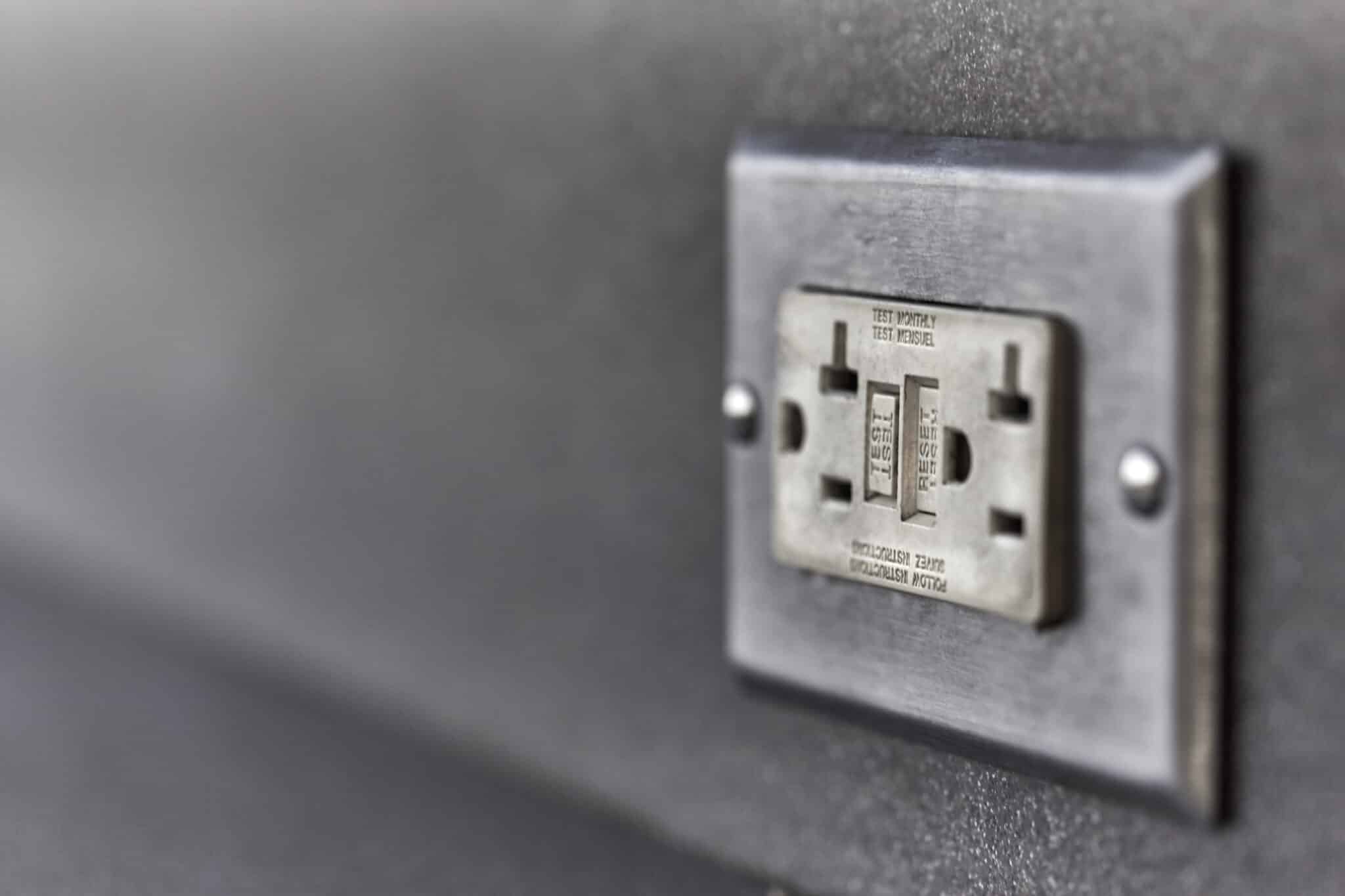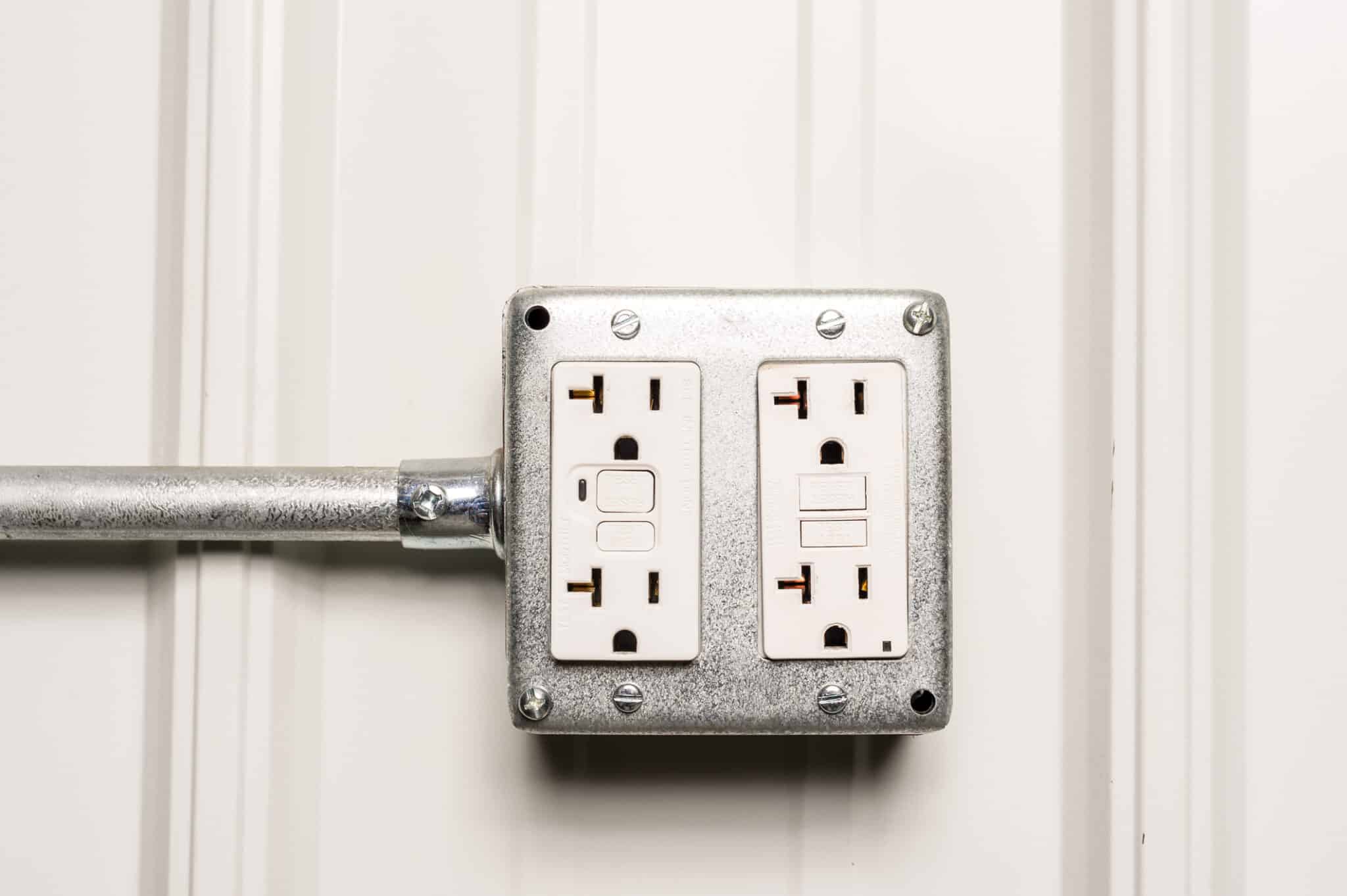GFCI outlets help keep you safe by stopping power quickly if a ground fault is detected. They’re required in places like kitchens, bathrooms, and outdoor spaces where the risk of electric shock is higher. These outlets are especially important in wet areas or during winter. Weather-resistant GFCI outlets add extra protection against moisture and freezing temps.
What Are GFCI Outlets and Why Are They Important?
Ever wonder how GFCI outlets keep your home safe?
GFCI stands for Ground Fault Circuit Interrupter.
These outlets are made to stop electrical hazards, especially in areas with moisture or higher risks of shocks.
When they detect unsafe electrical currents, they shut off power almost instantly.
This quick action can prevent shocks that could cause serious injuries.
These outlets are crucial because they react instantly to ground faults.
A ground fault happens when electricity escapes its proper path, often due to water or damaged wiring.
GFCI outlets catch this problem fast and shut off the circuit, protecting you from harm.
GFCIs don’t just keep you safe—they also protect your home’s wiring from long-term damage.
That’s why the National Electrical Code requires them in high-risk areas like kitchens, bathrooms, garages, and outdoor spaces.
This isn’t just a suggestion; it’s a key rule for safe electrical systems in modern homes.
For homeowners in Charleston, SC, ensuring the reliability of ground fault interrupter outlets is especially important.
The area’s humid climate and unpredictable weather make these outlets a must-have for keeping your home and family safe.
If you’re unsure about the condition of your GFCI outlets or need them installed, always trust a professional electrician, like the team at Mister Sparky of Charleston, to assist you.

How Do GFCI Outlets Work?
GFCI outlets are designed to protect against electrical hazards, especially ground faults that occur when electricity diverts from its normal path.
These advanced outlets constantly monitor the flow of electricity in a circuit.
If they detect even the slightest irregularity—caused by things like moisture, damaged appliances, or poor wiring—they cut off power within milliseconds.
This rapid response helps reduce the risk of serious injuries, including electric shocks that could cause significant harm.
The innovation lies in their built-in safety mechanism.
GFCI outlets detect minor discrepancies in the flow of electricity between the hot and neutral wires.
Any variation as small as 4 milliamps triggers an immediate shutdown of the circuit, safeguarding both you and your household.
Think of it as a vigilant protector, acting swiftly to prevent potential dangers.
These outlets not only offer safety but are also essential for compliance.
In North America, the National Electrical Code mandates the use of GFCI outlets in areas prone to moisture, such as kitchens, bathrooms, and outdoor spaces.
Failing to install them could jeopardize both your safety and your home’s adherence to electrical regulations.
If you’re in Charleston, SC, and need expert assistance with installing GFCI outlets, Mister Sparky of Charleston can ensure your home stays both secure and up to code.
Types of GFCI Outlets You Should Know
When it comes to GFCI outlets, knowing the types can help keep your home safe.
Here are the three main kinds you should know:
Standard Ground Fault Circuit Interrupters
These are the most common and are typically used in areas with moisture, like bathrooms and kitchens. They protect you by detecting ground faults and shutting off power fast—usually in under 40 milliseconds—to prevent electric shocks. The National Electrical Code requires these outlets in high-risk areas to keep your home safe.
Weather-Resistant Ground Fault Protection
These outlets are made for outdoor spaces or areas with tough conditions. They are built to handle moisture, dirt, and extreme temperatures. In places like Charleston, where there’s a lot of humidity and wet weather, these are essential. They’re durable and won’t corrode, which makes them perfect for rainy or cold seasons.
Portable GFCI Devices
If you need temporary protection, portable GFCIs are a great option. Use them for tools or appliances in garages or during outdoor work. They’re easy to carry and provide the same level of safety as conventional models.
Each type has its own purpose, so you can stay protected no matter the situation.
Important Note: Installation or replacement of these outlets should always be handled by a professional electrician.
Contact Mister Sparky of Charleston, SC, for professional electrical services to ensure the job is done safely and correctly.
Where You Need GFCI Outlets in Your Home
To keep your home safe, you need the right electrical outlets in key locations.
The National Electrical Code requires these outlets in high-risk areas to protect against electrical shocks.
Kitchens and Bathrooms
Kitchens and bathrooms deal with a lot of moisture, which increases the risk of electrical shocks. Ground-fault circuit interrupter (GFCI) outlets shut off the circuit instantly when they detect a fault caused by water. This quick action helps prevent injuries and protects your appliances.
Outdoor Areas in Charleston
With Charleston’s humid climate, outdoor spaces are more likely to have moisture issues. Adding protective outlets on patios, decks, and near pools keeps you safe when using outdoor lights or lawn tools—no matter the weather.
Garages and Basements
Garages and basements are often damp and used for heavy tools or appliances. Ground-fault outlets in these spaces reduce the risk of shocks and add extra protection for your family and belongings.
Stay safe with professionally installed safety outlets from Mister Sparky of Charleston, SC.
Why Weather-Resistant GFCI Outlets Matter in Winter
Winter in Charleston, SC, brings unique challenges for outdoor electrical safety.
That’s why weather-resistant outlets are crucial—they’re designed to handle freezing temps and moisture effectively.
Unlike regular outlets, these are built to keep functioning in harsh conditions, adding extra safety for your home.
Rain, snow, and Charleston’s coastal humidity can cause ground faults, which may lead to dangerous shocks.
GFCI outlets tough enough for wet conditions prevent these issues.
They also feature durable housings to withstand extreme winter weather, making them ideal for outdoor areas like patios, garages, and garden power sources.
Another big plus? These outlets safeguard your home’s electrical system when freezing temps increase the risk of electrical problems.
For example, if ice damages outdoor wires, a GFCI outlet shuts off the power almost instantly, reducing the risk of fires or shocks.
This safety mechanism operates in milliseconds and can prevent serious accidents or damage.
To ensure your outdoor wiring and outlets are safe, properly installed, and up to code this winter, rely on the trusted expertise of Mister Sparky of Charleston.
Common Problems and When to Call a Professional for GFCI Outlets
GFCI outlets are excellent for keeping your home safe by detecting and preventing electrical hazards, but they can occasionally run into problems.
If your outlet stops working, start by checking if it’s tripped.
A tripped outlet usually means it’s doing its job by cutting power to prevent a ground fault.
You can try pressing the “Reset” button in the center of the outlet to see if that resolves the issue.
If that doesn’t work, check your circuit breaker to see if it needs resetting as well.
If your outlet consistently trips, there may be underlying causes such as moisture, defective wiring, or a faulty appliance.
Moisture is a common issue, particularly during Charleston’s humid winters.
Ensure the outlet is dry and free from condensation.
For outlets that won’t reset or function properly, there may be internal damage, or the outlet might have reached the end of its life expectancy.
GFCI outlets typically last around 10 years.
If your outlet remains unresponsive or continues to have recurring issues, it’s crucial to contact Mister Sparky of Charleston, SC to assess and resolve the problem safely.
Don’t delay—addressing electrical concerns early helps protect your home and loved ones!
Winter Safety: Why You Need GFCI Outlets
Winter brings cold and damp weather that can turn small electrical problems into big dangers.
Installing GFCI outlets is a smart way to protect against electric shocks in wet or cold areas.
Unlike regular outlets, these specialized options can detect problems like moisture or faulty wiring and shut off power quickly, which can save lives and protect your home.
In a place like Charleston, SC, where the air is often damp and salty, these outlets are especially important.
Outdoor patios, garages, and basements are high-risk spots that can benefit from weather-resistant solutions.
They reduce the risk of shocks and help protect your appliances from electrical issues caused by changing weather, ensuring your electrical system stays safe and reliable.
Don’t overlook the importance of GFCI outlets this winter.
Whether it’s thunderstorms or cold morning condensation, having the right outlets in the right spots can keep you and your home protected.
For expert electrical installation, call Mister Sparky of Charleston—your trusted team for electrical safety.
How Often Should You Test GFCI Outlets?
You should test your GFCI outlets regularly to ensure they function properly and protect your home.
Experts recommend testing them once a month.
This helps ensure the outlet operates correctly, especially in higher-risk areas like the kitchen, bathroom, or outdoor spaces around the Charleston area.
To test, press the “Test” button on the outlet. This should make the “Reset” button pop out and cut power to anything plugged in. If the power doesn’t stop, the outlet may be malfunctioning and should be examined by a professional, such as the electricians at Mister Sparky of Charleston, SC. After testing, press the “Reset” button to restore the power. This quick check ensures the outlet remains reliable and ready to protect you.
Monthly tests are particularly important during the winter when moisture and freezing temperatures can pose additional risks.
Since GFCI outlets are required in areas near water by the National Electrical Code, staying proactive with this routine check will provide peace of mind.
By making this a habit, you enhance the safety of your home and family.
The Difference Between GFCI and AFCI Outlets
Knowing the difference between GFCI (Ground Fault Circuit Interrupter) and AFCI (Arc Fault Circuit Interrupter) outlets is key to keeping your home safe.
Both protect you, but they handle different dangers.
GFCI outlets stop ground faults caused by water or bad electrical connections.
For example, if water gets into the system—common in places like kitchens or bathrooms—the GFCI shuts off power right away to stop shocks or electrocution.
These outlets are required in kitchens, bathrooms, garages, and outdoor spaces by the National Electrical Code.
This is especially important in Charleston, SC, where high humidity and flooding happen often.
AFCI outlets, on the other hand, help stop electrical fires.
They detect arc faults, which happen when electricity jumps due to damaged wires, bad connections, or overloaded circuits.
These arcs can cause house fires and are best for living rooms and bedrooms to prevent such risks.
Simply put, GFCI outlets protect you from shocks in wet areas, while AFCI outlets help stop fires in dry spaces.
Together, they keep your home safe.
Having them inspected and installed by experts like Mister Sparky of Charleston ensures your home is protected in every part.
Should You Install a GFCI Outlet on Your Own?
Installing GFCI outlets might seem simple, but it’s more complicated than it appears.
Attempting this task without proper knowledge of electrical work and local codes can lead to mistakes that may damage the outlet or create safety hazards, such as shocks or ground faults.
In Charleston, SC, the humid climate increases the risks associated with improper installation.
Outlets in areas like kitchens, bathrooms, or outdoor spaces must adhere to strict safety standards.
An incorrect installation could leave your home vulnerable to electrical issues or safety concerns.
For peace of mind and reliable results, it’s best to leave the job to a professional, like Mister Sparky of Charleston.
They are equipped to handle wiring, testing, and compliance with local regulations, ensuring the installation is done safely and effectively.
When it comes to your home’s safety, turning to an expert is always the wise choice.
GFCI Outlets: What Charleston, SC Homeowners Need to Know
In Charleston, SC, building codes require ground fault circuit interrupter outlets in places like kitchens, bathrooms, garages, and outdoor areas to protect against ground faults.
But Charleston’s coastal climate adds extra challenges.
The salty air and high humidity can wear down electrical parts faster, so it’s important to use weather-resistant GFCI outlets in damp or outdoor spaces.
Charleston’s winters aren’t freezing, but they bring more rain and moisture, which raises ground fault risks.
Installing GFCI outlets on patios, near pools, or in other outdoor areas is a smart way to reduce moisture-related risks.
These outlets are built to handle wet conditions, helping to maintain your home’s safety year-round.
Charleston is also full of older homes with outdated electrical systems.
If your home has an older setup, it’s important to hire a professional like Mister Sparky of Charleston.
They can update your system to meet today’s codes while preserving your home’s historic character.
GFCIs and Saving Energy in Modern Homes
GFCI outlets not only enhance safety but also improve electrical efficiency in modern homes.
These outlets serve as a safeguard against energy-wasting ground faults, which can be especially troublesome in older wiring systems.
Installing GFCIs ensures your home operates more efficiently while maintaining vital safety protections.
These outlets integrate well with advanced systems commonly found in energy-conscious homes.
When paired with energy-efficient appliances and lighting, GFCI outlets contribute to optimized power usage without compromising safety.
The latest models, which also detect arc faults (AFCIs), go a step further by identifying potential sparks early, protecting your home, and extending the life of your electrical components.
Combining safety with energy efficiency, GFCI outlets are essential features for modern homes.
If you’re located in Charleston, SC, reach out to Mister Sparky of Charleston to ensure your electrical system is efficient and safe.
Their team is equipped to help upgrade your home with the latest in electrical technology.

FAQs
What are GFCI outlets, and why do they matter in winter?
GFCI outlets, or Ground Fault Circuit Interrupters, shut off power fast to prevent electrical shocks. In winter, when it’s wet and icy in Charleston, SC, these devices help keep spaces like kitchens, bathrooms, and outdoor areas safer.
How can I tell if my GFCI outlet works?
It’s simple to check. Press “Test,” and the power should go off. Then press “Reset” to turn it back on. If it doesn’t trip or reset, contact a professional, such as Mister Sparky of Charleston.
Do GFCI outlets stop my appliances from breaking during power surges?
GFCI outlets primarily protect against shocks, but they can assist in safeguarding appliances during ground faults. For comprehensive surge protection, consider having an expert install a surge protector.
Why use weather-resistant GFCI outlets outside?
Weather-resistant types are built for wet and cold conditions. They perform well during Charleston’s winters and are required in outdoor or damp areas.
How often should I test GFCI outlets?
Test them each month. This ensures they’re functioning correctly and providing optimal safety.









